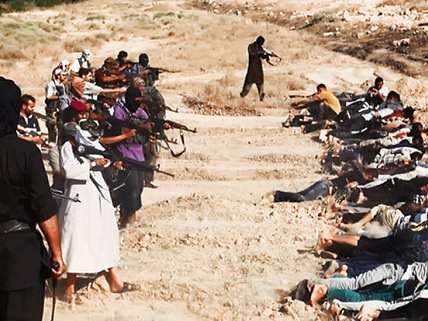Shiite Fighters Pull Out of Anti-ISIS Fight Over U.S. Participation

Most Americans first heard about Shiite and Sunni being different kinds of Islam in the aftermath of 9/11. The over-simplification of the divide helped push forward flimsy arguments for toppling Saddam Hussein's Sunni regime, like the (non-existent) connection with the Sunni terrorist group Al-Qaeda, responsible for 9/11.
85 to 90 percent of the world's Muslims, in fact, are Sunni. Most regimes in the Arab world, including U.S. allies like Saudi Arabia, which is now conducting air strikes against Shiite rebels in Yemen, while not democratic or quite representative of their populations, are also Sunni. After the U.S. invasion of Iraq, that country became one of the few Shi'ite-led countries in the region—Iran is another. The division, and the alliances that fall along it, is why the conflict in Yemen is considered a proxy battle between Saudi Arabia and Iran.
In Iraq, Shiite militias are a major force in the battle against the Islamic State in Iraq and Syria (ISIS), originally an off-shoot of Al-Qaeda. They make up up to a third of the 30,000 fighters in Iraq mobilized against ISIS, and are now threatening to exit the fight over foreign, and mainly U.S., participation. The New York Times reports:
By Day 2 of the American airstrike campaign against militants holed up in Tikrit, the mission appeared beleaguered on several fronts on Thursday: Thousands of Shiite militiamen boycotted the fight, others threatened to attack any Americans they found, and Iraqi officials said nine of their fighters had been accidentally killed in an airstrike.
In Washington, American military leaders insisted that things were going according to plan. They said that they were stepping into the Tikrit fight only after the Iranian and militia-led advance on the city had stalled after three weeks, and that they welcomed working solely with Iraqi government forces.
The U.S. shouldn't be welcoming working with fewer partners because that means taking up more of the responsibility in the fight. And that only guarantees a more active role for the U.S. in the war against ISIS, not victory. When he committed U.S. forces to the fight against ISIS, President Obama pointed to U.S. operations in Yemen as a model. The U.S. has now pulled out of Yemen after the government was overrun by rebels and as the country slips into chaos.
Hawks like Sen. Ted Cruz (R-Tex.), now running for president, fault President Obama's policies in places like Yemen for not being interventionist enough. In a January op-ed, Cruz appeared to blame Obama's policies for the Yemen collapse—not the bombings on behalf of an autocratic government but the fact that U.S. counterterrorism policy wasn't aggressive enough in Yemen.
The Jerusalem Post recently posited that the "Sunni-Shiite wars" were going global. Given the U.S.'s goals and alignments in the region, it's found itself at the same time on both sides of the various manifestations of that conflict and against both sides.
